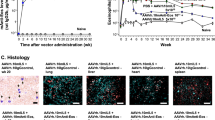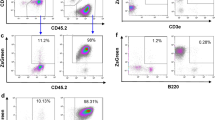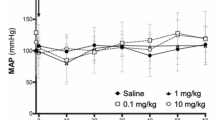Abstract
Antiangiogenic gene therapy offers an attractive approach to the treatment of a variety of malignancies, including those of the hematological system. However, evaluation of this approach has been hampered by the lack of appropriate animal models. We have recently produced transgenic mice expressing P230 bcr/abl that develop myeloproliferative disease (MPD) closely resembling human chronic myelogenous leukemia. Using this MPD murine model, we examined the feasibility of systemic antiangiogenic gene therapy for hematological malignancy. An adenoviral vector containing the secretable endostatin gene was injected into the right quadriceps muscle of the MPD mice. The increased endostatin level was detected for at least 6 months. Hematological parameters including platelet counts, granulocyte counts, and the hemoglobin concentration were improved by this gene therapy. Infiltration of megakaryocytes was also significantly inhibited in treated MPD mice. Reduction of the microvessel density was confirmed by histological examination. These results demonstrated, for the first time, that antiangiogenic gene therapy is effective to inhibit leukemogenesis caused by expression of the chimeric bcr/abl gene.
This is a preview of subscription content, access via your institution
Access options
Subscribe to this journal
Receive 12 print issues and online access
$259.00 per year
only $21.58 per issue
Buy this article
- Purchase on Springer Link
- Instant access to full article PDF
Prices may be subject to local taxes which are calculated during checkout



Similar content being viewed by others
References
McCormick F . Cancer gene therapy: fringe or cutting edge? Nat Rev Cancer 2001; 1: 130–141.
Rainov NG, Ren H . Clinical trials with retrovirus mediated gene therapy – what have we learned? J Neurooncol 2003; 65: 227–236.
Zeimet AG, Marth C . Why did p53 gene therapy fail in ovarian cancer? Lancet Oncol 2003; 4: 415–422.
Weidner N, Semple JP, Welch WR, Folkman J . Tumor angiogenesis and metastasis – correlation in invasive breast carcinoma. N Engl J Med 1991; 324: 1–8.
O'Reilly MS et al. Angiostatin: a novel angiogenesis inhibitor that mediates the suppression of metastases by a Lewis lung carcinoma. Cell 1994; 79: 315–328.
O'Reilly MS et al. Endostatin: an endogenous inhibitor of angiogenesis and tumor growth. Cell 1997; 88: 277–285.
Tanaka T, Cao Y, Folkman J, Fine HA . Viral vector-targeted antiangiogenic gene therapy utilizing an angiostatin complementary DNA. Cancer Res 1998; 58: 3362–3369.
Ma HI et al. Intratumoral gene therapy of malignant brain tumor in a rat model with angiostatin delivered by adeno-associated viral (AAV) vector. Gene Therapy 2002; 9: 2–11.
Blezinger P et al. Systemic inhibition of tumor growth and tumor metastases by intramuscular administration of the endostatin gene. Nat Biotechnol 1999; 17: 343–348.
Sauter BV et al. Adenovirus-mediated gene transfer of endostatin in vivo results in high level of transgene expression and inhibition of tumor growth and metastases. Proc Natl Acad Sci USA 2000; 97: 4802–4807.
Moehler TM, Ho AD, Goldschmidt H, Barlogie B . Angiogenesis in hematologic malignancies. Crit Rev Oncol Hematol 2003; 45: 227–244.
Padro T et al. Increased angiogenesis in the bone marrow of patients with acute myeloid leukemia. Blood 2000; 95: 2637–2644.
Brunner B et al. Blood levels of angiogenin and vascular endothelial growth factor are elevated in myelodysplastic syndromes and in acute myeloid leukemia. J Hematother Stem Cell Res 2002; 11: 119–125.
Yetgin S, Yenicesu I, Cetin M, Tuncer M . Clinical importance of serum vascular endothelial and basic fibroblast growth factors in children with acute lymphoblastic leukemia. Leukemia Lymphoma 2001; 42: 83–88.
Scappaticci FA et al. Combination angiostatin and endostatin gene transfer induces synergistic antiangiogenic activity in vitro and antitumor efficacy in leukemia and solid tumors in mice. Mol Ther 2001; 3: 186–196.
Eisterer W et al. Unfulfilled promise of endostatin in a gene therapy – xenotransplant model of human acute lymphocytic leukemia. Mol Ther 2002; 5: 352–359.
Inokuchi K et al. Myeloproliferative disease in transgenic mice expressing P230 Bcr/Abl: longer disease latency, thrombocytosis, and mild leukocytosis. Blood 2003; 102: 320–323.
Verstovsek S et al. Prognostic significance of cellular vascular endothelial growth factor expression in chronic phase chronic myeloid leukemia. Blood 2002; 99: 2265–2267.
Verstovsek S et al. Neutrophilic-chronic myeloid leukemia: low levels of p230 BCR/ABL mRNA and undetectable BCR/ABL protein may predict an indolent course. Cancer 2002; 94: 2416–2425.
Gora-Tybor J, Blonski JZ, Robak T . Circulating proangiogenic cytokines and angiogenesis inhibitor endostatin in untreated patients with chronic lymphocytic leukemia. Mediators Inflamm 2003; 12: 167–171.
Green NK, Seymour LW . Adenoviral vectors: systemic delivery and tumor targeting. Cancer Gene Ther 2002; 9: 1036–1042.
Jiang Z, Feingold E, Kochanek S, Clemens PR . Systemic delivery of a high-capacity adenoviral vector expressing mouse CTLA4Ig improves skeletal muscle gene therapy. Mol Ther 2002; 6: 369–376.
Ben-Gary H et al. Systemic interleukin-6 responses following administration of adenovirus gene transfer vectors to humans by different routes. Mol Ther 2002; 6: 287–297.
Brunetti-Pierri N et al. Acute toxicity after high-dose systemic injection of helper-dependent adenoviral vectors into nonhuman primates. Hum Gene Ther 2004; 15: 35–46.
St George JA . Gene therapy progress and prospects: adenoviral vectors. Gene Therapy 2003; 10: 1135–1141.
Buning H et al. AAV-based gene transfer. Curr Opin Mol Ther 2003; 5: 367–375.
Chao H et al. Several log increase in therapeutic transgene delivery by distinct adeno-associated viral serotype vectors. Mol Ther 2000; 2: 619–623.
Gao GP et al. Novel adeno-associated viruses from rhesus monkeys as vectors for human gene therapy. Proc Natl Acad Sci USA 2002; 99: 11854–11859.
De Palma M, Venneri MA, Roca C, Naldini L . Targeting exogenous genes to tumor angiogenesis by transplantation of genetically modified hematopoietic stem cells. Nat Med 2003; 9: 789–795.
Acknowledgements
We thank Dr Izumu Saito for generous provision of plasmids and Ad vector, Dr Tsutomu Igarashi for expert technical assistance and helpful discussion. This work was supported in part by grants from the Ministry of Health and Welfare of Japan and the Ministry of Education, Science, and Culture of Japan.
Author information
Authors and Affiliations
Rights and permissions
About this article
Cite this article
Miyake, K., Inokuchi, K., Miyake, N. et al. Antiangiogenic gene therapy of myeloproliferative disease developed in transgenic mice expressing P230 bcr/abl. Gene Ther 12, 541–545 (2005). https://doi.org/10.1038/sj.gt.3302427
Received:
Accepted:
Published:
Issue Date:
DOI: https://doi.org/10.1038/sj.gt.3302427



